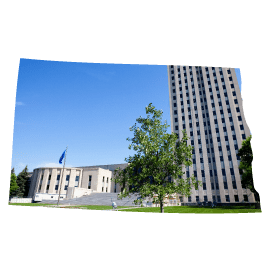Licensure Loopholes: North Dakota
Exiting Ineffective Teachers Policy
Analysis of North Dakota's policies
North Dakota allows new teachers who have not met licensure requirements to teach under the alternative access license, which is issued in areas where there is a documented shortage of regularly licensed teachers. The applicant must have a bachelor's degree in the content area to be assigned, and renewal depends on supply and demand of certificated teachers available for these positions. The alternate access can be renewed annually, but the "license will be issued only once to complete all testing requirements for regular licensure."
Recommendations for North Dakota
Ensure that all teachers pass required subject-matter licensing tests before they enter the classroom.
While North Dakota's policy minimizes the risks brought about by having teachers in classrooms who lack sufficient or appropriate subject-matter knowledge by offering its alternative license for one year only before teachers are required to take the required subject-matter tests, the state could take its policy a step further and require all teachers to meet subject-matter license requirements prior to entering the classroom.
State response to our analysis
North Dakota had no comment on this goal.
Select another topic
Delivering Well Prepared Teachers
- Admission into Preparation Programs
- Elementary Teacher Preparation
- Elementary Teacher Preparation in Reading Instruction
- Elementary Teacher Preparation in Mathematics
- Middle School Teacher Preparation
- Secondary Teacher Preparation
- Secondary Teacher Preparation in Science
- Secondary Teacher Preparation in Social Studies
- Special Education Teacher Preparation
- Assessing Professional Knowledge
- Student Teaching
- Teacher Preparation Program Accountability
Expanding the Pool of Teachers
Identifying Effective Teachers
- State Data Systems
- Evaluation of Effectiveness
- Frequency of Evaluations
- Tenure
- Licensure Advancement
- Equitable Distribution
Retaining Effective Teachers
Exiting Ineffective Teachers
Research rationale
Research has shown that "the difference in student performance in a single academic year from having a good as opposed to a bad teacher can be more than one full year of standardized achievement." See E. Hanushek, "The Trade-Off between Child Quantity and Quality," The Journal of Political Economy 100 No. 1 (1992): 84-117. Hanushek has also found that highly effective teachers can improve future student earnings by more than $400,000, assuming a class of 20. "The Economic Value of Higher Teacher Quality." National Bureau of Economic Research. Working Paper 16606 (2010).

